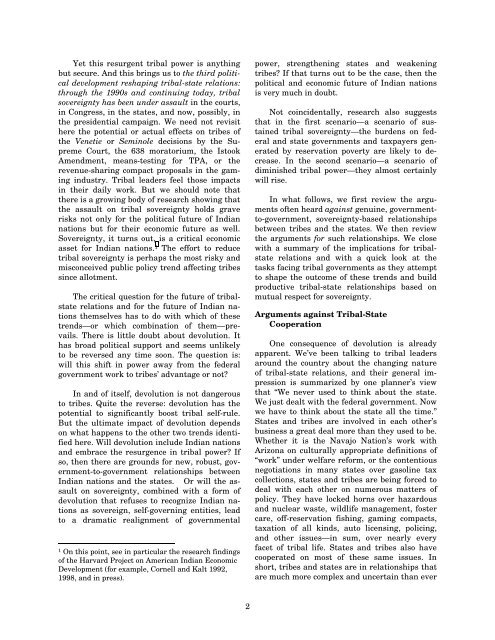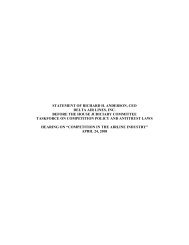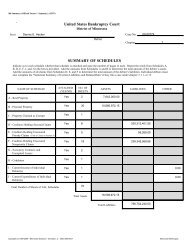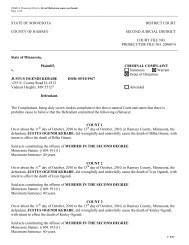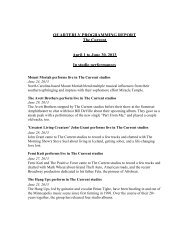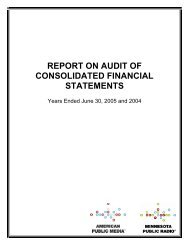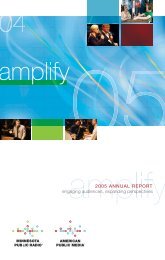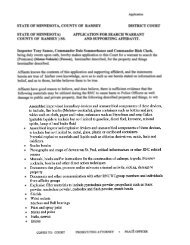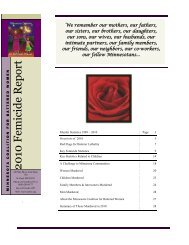Stephen Cornell and Jonathan Taylor - American Public Media
Stephen Cornell and Jonathan Taylor - American Public Media
Stephen Cornell and Jonathan Taylor - American Public Media
You also want an ePaper? Increase the reach of your titles
YUMPU automatically turns print PDFs into web optimized ePapers that Google loves.
Yet this resurgent tribal power is anything<br />
but secure. And this brings us to the third political<br />
development reshaping tribal-state relations:<br />
through the 1990s <strong>and</strong> continuing today, tribal<br />
sovereignty has been under assault in the courts,<br />
in Congress, in the states, <strong>and</strong> now, possibly, in<br />
the presidential campaign. We need not revisit<br />
here the potential or actual effects on tribes of<br />
the Venetie or Seminole decisions by the Supreme<br />
Court, the 638 moratorium, the Istook<br />
Amendment, means-testing for TPA, or the<br />
revenue-sharing compact proposals in the gaming<br />
industry. Tribal leaders feel those impacts<br />
in their daily work. But we should note that<br />
there is a growing body of research showing that<br />
the assault on tribal sovereignty holds grave<br />
risks not only for the political future of Indian<br />
nations but for their economic future as well.<br />
Sovereignty, it turns out, is a critical economic<br />
asset for Indian nations. 1 The effort to reduce<br />
tribal sovereignty is perhaps the most risky <strong>and</strong><br />
misconceived public policy trend affecting tribes<br />
since allotment.<br />
The critical question for the future of tribalstate<br />
relations <strong>and</strong> for the future of Indian nations<br />
themselves has to do with which of these<br />
trends—or which combination of them—prevails.<br />
There is little doubt about devolution. It<br />
has broad political support <strong>and</strong> seems unlikely<br />
to be reversed any time soon. The question is:<br />
will this shift in power away from the federal<br />
government work to tribes’ advantage or not?<br />
In <strong>and</strong> of itself, devolution is not dangerous<br />
to tribes. Quite the reverse: devolution has the<br />
potential to significantly boost tribal self-rule.<br />
But the ultimate impact of devolution depends<br />
on what happens to the other two trends identified<br />
here. Will devolution include Indian nations<br />
<strong>and</strong> embrace the resurgence in tribal power? If<br />
so, then there are grounds for new, robust, government-to-government<br />
relationships between<br />
Indian nations <strong>and</strong> the states. Or will the assault<br />
on sovereignty, combined with a form of<br />
devolution that refuses to recognize Indian nations<br />
as sovereign, self-governing entities, lead<br />
to a dramatic realignment of governmental<br />
1 On this point, see in particular the research findings<br />
of the Harvard Project on <strong>American</strong> Indian Economic<br />
Development (for example, <strong>Cornell</strong> <strong>and</strong> Kalt 1992,<br />
1998, <strong>and</strong> in press).<br />
2<br />
power, strengthening states <strong>and</strong> weakening<br />
tribes? If that turns out to be the case, then the<br />
political <strong>and</strong> economic future of Indian nations<br />
is very much in doubt.<br />
Not coincidentally, research also suggests<br />
that in the first scenario—a scenario of sustained<br />
tribal sovereignty—the burdens on federal<br />
<strong>and</strong> state governments <strong>and</strong> taxpayers generated<br />
by reservation poverty are likely to decrease.<br />
In the second scenario—a scenario of<br />
diminished tribal power—they almost certainly<br />
will rise.<br />
In what follows, we first review the arguments<br />
often heard against genuine, governmentto-government,<br />
sovereignty-based relationships<br />
between tribes <strong>and</strong> the states. We then review<br />
the arguments for such relationships. We close<br />
with a summary of the implications for tribalstate<br />
relations <strong>and</strong> with a quick look at the<br />
tasks facing tribal governments as they attempt<br />
to shape the outcome of these trends <strong>and</strong> build<br />
productive tribal-state relationships based on<br />
mutual respect for sovereignty.<br />
Arguments against Tribal-State<br />
Cooperation<br />
One consequence of devolution is already<br />
apparent. We’ve been talking to tribal leaders<br />
around the country about the changing nature<br />
of tribal-state relations, <strong>and</strong> their general impression<br />
is summarized by one planner’s view<br />
that “We never used to think about the state.<br />
We just dealt with the federal government. Now<br />
we have to think about the state all the time.”<br />
States <strong>and</strong> tribes are involved in each other’s<br />
business a great deal more than they used to be.<br />
Whether it is the Navajo Nation’s work with<br />
Arizona on culturally appropriate definitions of<br />
“work” under welfare reform, or the contentious<br />
negotiations in many states over gasoline tax<br />
collections, states <strong>and</strong> tribes are being forced to<br />
deal with each other on numerous matters of<br />
policy. They have locked horns over hazardous<br />
<strong>and</strong> nuclear waste, wildlife management, foster<br />
care, off-reservation fishing, gaming compacts,<br />
taxation of all kinds, auto licensing, policing,<br />
<strong>and</strong> other issues—in sum, over nearly every<br />
facet of tribal life. States <strong>and</strong> tribes also have<br />
cooperated on most of these same issues. In<br />
short, tribes <strong>and</strong> states are in relationships that<br />
are much more complex <strong>and</strong> uncertain than ever


